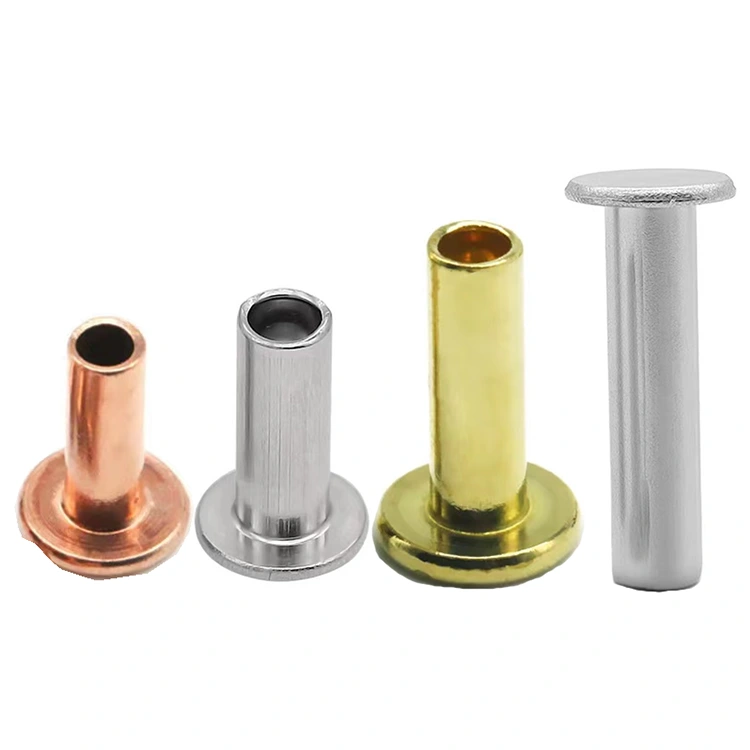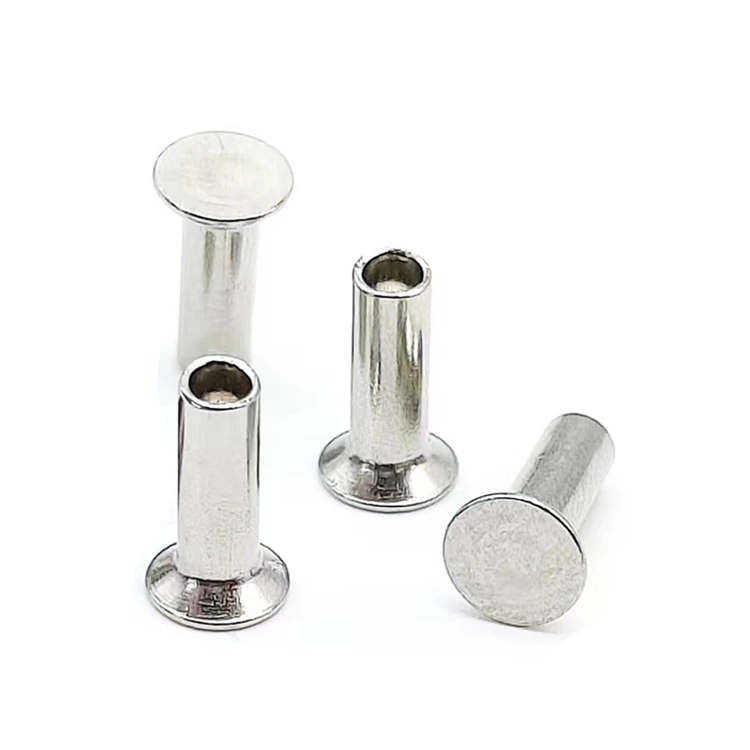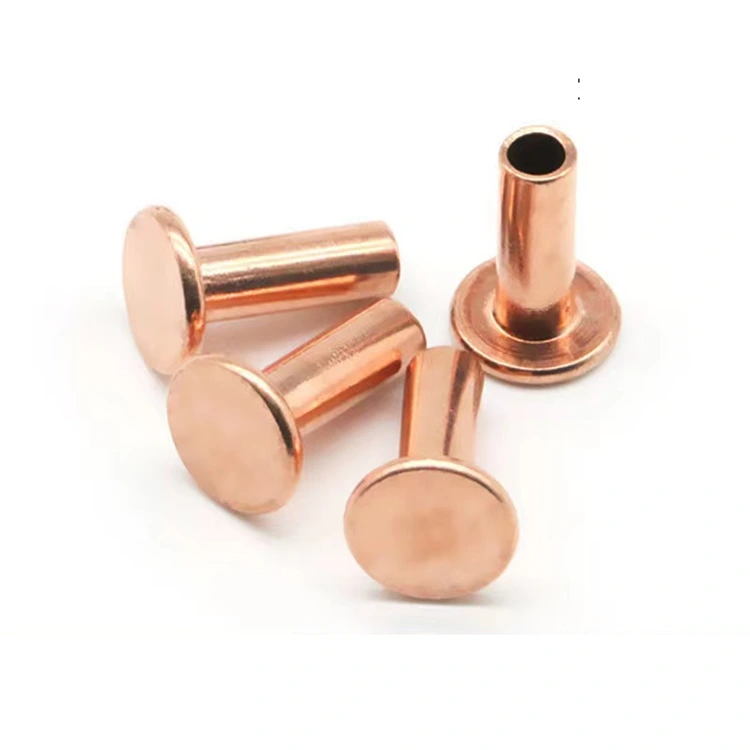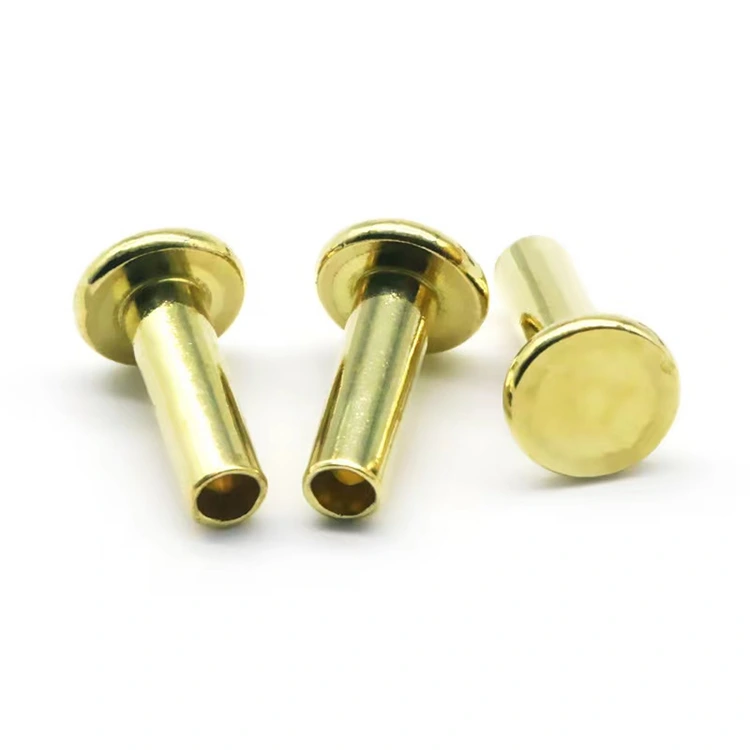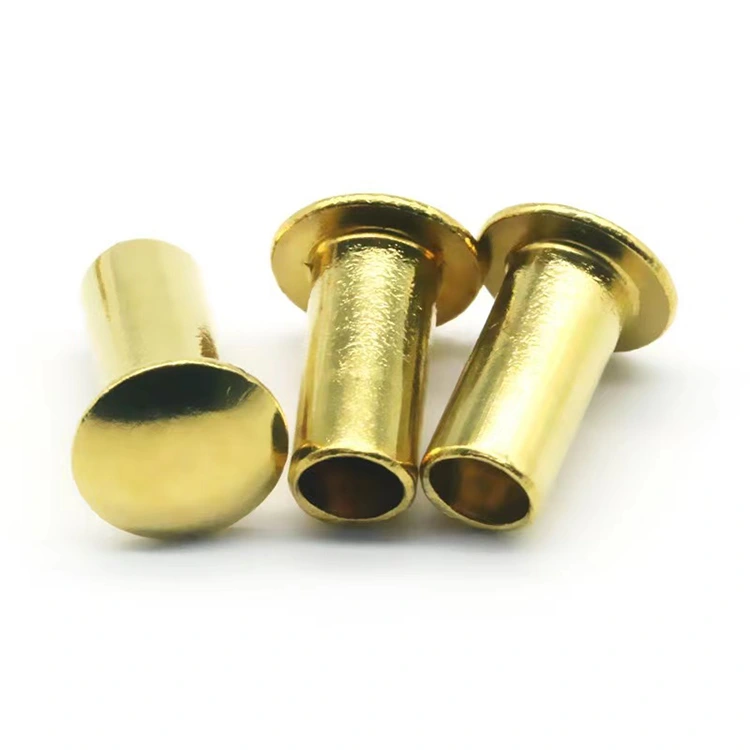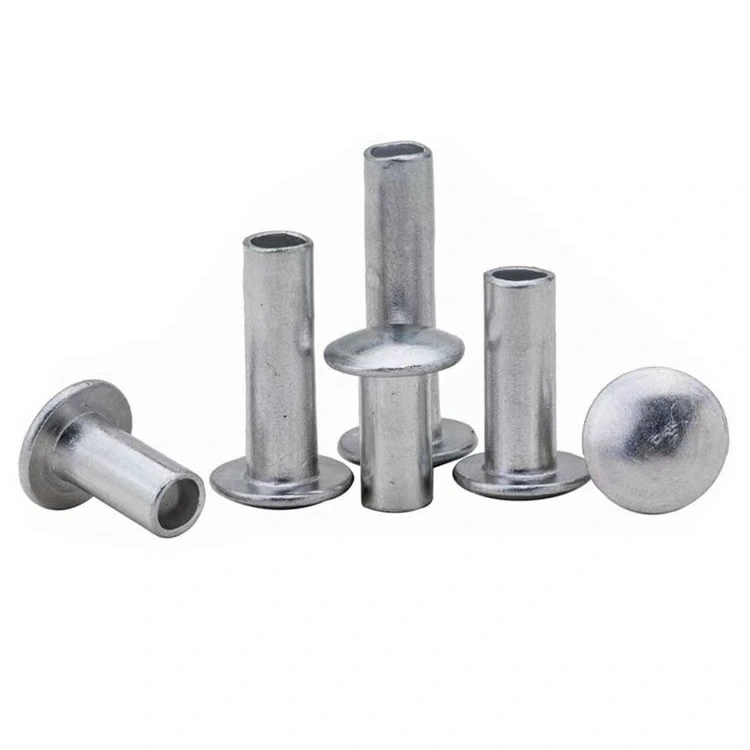Nitter
As one of professional manufacturer in China, Notin would like to provide you Rivets. And we will offer you the best after-sale service and timely delivery.
What is a rivet?
A rivet is a permanent mechanical fastener used to join two or more materials. Rivets work by inserting a metal pin into an aligned hole and deforming the end, creating a strong, secure, and durable connection. Unlike temporary fasteners like screws, rivets do not rely on threads, but instead form a permanent connection, making them ideal for applications requiring high strength, durability, and vibration resistance.
Classification of Rivets
Rivets are typically categorized by head shape, degree of hollowness, or material.
Based on head shape, rivets can be classified as flat head rivets, round head rivets, countersunk head rivets, mushroom head rivets, universal head rivets, truss head rivets, etc.

Based on degree of hollowness, rivets can be classified as solid rivets, semi-tubular rivets, or full tubular rivets.
Based on material, rivets can be classified as brass rivets, stainless steel rivets, steel rivets, aluminum rivets, copper rivets, etc.
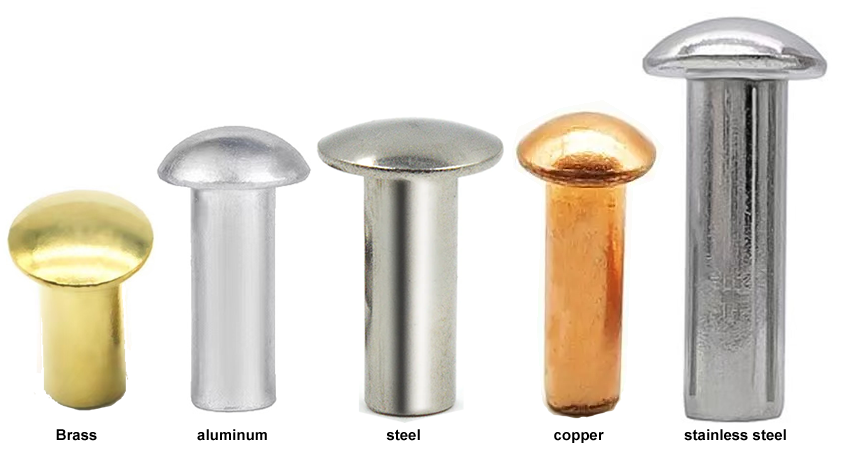
What surface finishes are available for rivets?
Rivet surfaces are typically treated with rust-proofing treatments, primarily electroplating, including zinc plating, nickel plating, chrome plating, tin plating, gold plating, and silver plating. Electroplating is a common rust-proofing method for rivets. It applies a layer of plating to the rivet surface through physical or chemical methods. The plating effectively prevents corrosion and rust, while also providing a certain aesthetic effect.
Another special surface treatment method is head coating. Head coating is performed after the rivet is electroplated. This allows for a variety of colors on the rivet head, achieving an aesthetically pleasing finish.
Aluminum rivets cannot be electroplated, but they can be anodized. Anodizing also allows for a variety of color options, but the unit price is higher than electroplating.
Rust-proofing the rivet surface is crucial, effectively extending the rivet's service life and ensuring a secure connection. Different rust-proofing methods are suitable for different environments and applications, so the choice should be tailored to the specific situation.
- View as
Fladt Hoved Halv Hule Nitter
Nitning er en almindelig metode til at fastgøre to eller flere komponenter sammen i industriel fremstilling og daglig vedligeholdelse. Fladhoved halvhule nitter er en type nitter, tilbyder unikke design og anvendelsesfordele. Nuote Metals er en professionel producent af halvhule nitter med fladt hoved. Vi er beliggende i Dongguan, Kina, og vi har rigelige overfladebehandlingsressourcer og bekvem transport, hvilket reducerer omkostningerne ved nitteproduktion.
Læs mereSend forespørgselForsænket hoved halvhule nitter
Halvhulnitter med forsænket hoved er en speciel type nitter, opkaldt efter deres unikke strukturelle design. "Forsænket" betyder, at nittehovedet flugter med eller lidt under forbindelsesfladen efter montering, hvilket skaber et glat udseende og undgår ulejligheden eller faren ved udragende dele. "Halvhul" refererer til nittens delvist hule indre struktur, hvilket muliggør hurtig og effektiv fastgørelse ved hjælp af specialværktøj under installationen.
Læs mereSend forespørgselKobber halvhule nitter
Du kender kobber – det er det troværdige materiale, der aldrig svigter dig, når du har brug for stor elektrisk og termisk ledningsevne. Derfor er halvhule kobbernitter et så solidt valg – de kombinerer kobbers naturlige styrker med et smart semi-hult design, der bare får arbejdet gjort. Her hos Nuote Metals er dette vores speciale. Vi er blevet den betroede kilde til disse alsidige kobbernitter, der bliver ved med at dukke op i flere og flere industrielle anvendelser. Vores team omfatter flere ingeniører, som har lavet nitter i over ti år. Vi sætter en ære i vores arbejde - hver enkelt nitte får omhyggelig opmærksomhed fra formdesign til det færdige produkt. Vi er ret særlige med at få alle detaljerne helt rigtige.
Læs mereSend forespørgselHalvrørsnitter af messing
Halvrørsnitter af messing - de er som de trofaste metalfastgørelseselementer med en hul kerne, der går cirka halvvejs ned. Vi laver dem af messing, som grundlæggende er en blanding af kobber og zink. Det, der er fantastisk ved messing, er, at det ikke ruster let og kan tåle et rigtigt slag. Det er derfor, du finder disse små arbejdsheste næsten overalt. Tag et nærmere kig på en af disse nitter, og du vil se to enkle dele: Hovedet, der hviler ovenpå, og skaftet, der stikker igennem, hvad end du slutter dig til. Her er den smarte del - det hule center i skaftet. Når du sætter nitten, er det det, der lader bunden blusse ud og gribe fast. Når den først er i, går den ingen vegne.
Læs mereSend forespørgselHalvhule messingnitter
Nuote Metals har specialiseret sig i produktion af halvhule messingnitter. Vores virksomhed er beliggende i Dongguan, Kina, en by med varmt vejr og en blomstrende industrisektor. Halvhulnitter af messing er meget udbredt i industriel fremstilling og hverdagsliv. De er lavet af messing og har specifikke strukturelle og funktionelle egenskaber. Disse nitter er en nøglespiller i utallige industrier. I årenes løb er deres design og måden, de er lavet på, blevet finjusteret, hvilket gør dem til en must-have del for mange produkter.
Læs mereSend forespørgselHalvhule aluminiumnitter
Halvhule aluminiumnitter er dybest set fastgørelseselementer lavet af aluminiumslegering. De har et solidt hoved og en hale, der er delvist hul. Når du installerer dem med et specielt værktøj, blusser den hule sektion ud og krøller tilbage, hvilket skaber en virkelig stærk, fastlåst samling. Fordi de er af aluminium, er de naturligvis lette og ruster ikke let, hvilket er et stort plus, når du er bekymret for vægten eller bruger dem i hårde miljøer. Når du stable dem op mod nitter lavet af andre materialer, rammer de virkelig et sweet spot mellem at være overkommelige og at yde godt.
Læs mereSend forespørgselWhat are the advantages of rivets over other fasteners?
1. Ease of Installation
Rivets are fast to install, and even fully automated for high-volume applications, resulting in a simple and efficient operation process.
2. Connection Reliability
The riveting process is standardized, with strict quality control, resulting in highly stable connections. Visual inspection allows for quick verification of connection quality.
3. Vibration and Impact Resistance
Rivets connect through deformation or interference fit, providing strong clamping force and excellent vibration resistance, capable of withstanding vibration and shock.
4. Low Cost
Rivets are easy to install and can be fully automated, saving significant labor costs.
What are the advantages and disadvantages of rivets made of different materials?
Aluminum Rivets
Advantages: Lightweight, reduces overall product weight, low cost, suitable for general civilian applications.
Disadvantages: Low tensile and shear strength, unsuitable for high-strength workpieces, prone to electrochemical corrosion when in contact with metals such as stainless steel.
Stainless Steel Rivets
Advantages: Strong corrosion resistance, high hardness, suitable for high-strength workpieces (such as marine equipment)
Disadvantages: Higher cost, typically more expensive than aluminum rivets of the same specification.
Brass and Copper Rivets
Advantages: Excellent conductivity (such as connecting electronic components), good corrosion resistance.
Disadvantages: Higher cost, more difficult to process.
Steel Rivets
Advantages: High hardness, high connection reliability, and wide applicability.
Disadvantages: Compared to other materials, iron rivets are more prone to rusting.
What are the main applications of rivets?
Rivets have a wide range of uses, from small items like a pair of scissors to large items like airplanes and ships, as well as in high-precision medical applications.
Industrial Manufacturing
Rivets are used in a wide variety of industrial fields, wherever there is a need to connect two or more materials.
Electronics
Rivets secure heat sinks and chips, providing both vibration damping and noise reduction, and are widely used in the cooling systems of electronic products such as computers and mobile phones.
Automotive
Rivets are widely used to connect components of automobile bodies and chassis, such as doors and hoods. Their lightweight and corrosion-resistant properties make them an indispensable joining method in automotive manufacturing.
Aerospace
In aircraft manufacturing, rivets are used to connect different fuselage components, such as wings and tailplanes. Millions of rivets create high-strength, corrosion-resistant joints. Aluminum and titanium alloy rivets are often used to connect components of corresponding materials, ensuring stability in extreme environments.
Rivets are used everywhere. The above examples only represent a small number of their applications. We see rivets everywhere in our daily lives, such as on scissors, folding beds, and strollers etc. Rivets can be customized to different sizes and materials depending on the application.
Nuote Metals has specialized in the rivet industry for over a decade. Our factory is located in Dongguan, a city known as the "World Factory," a city with a developed industry and convenient transportation. This allows us to respond quickly when acquiring raw materials and supporting surface treatments, meeting our customers' needs for quick access to samples and bulk orders. We produce 10 million rivets daily and have molds of various specifications, allowing us to produce rivets as small as 0.8mm and as large as 10mm. We welcome your inquiries and visits.







